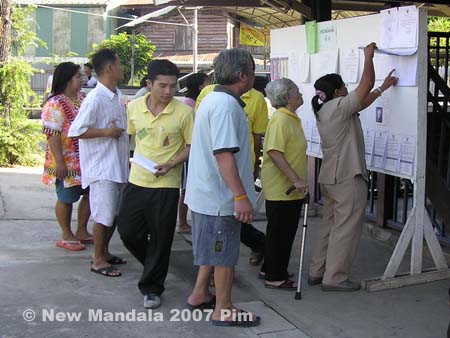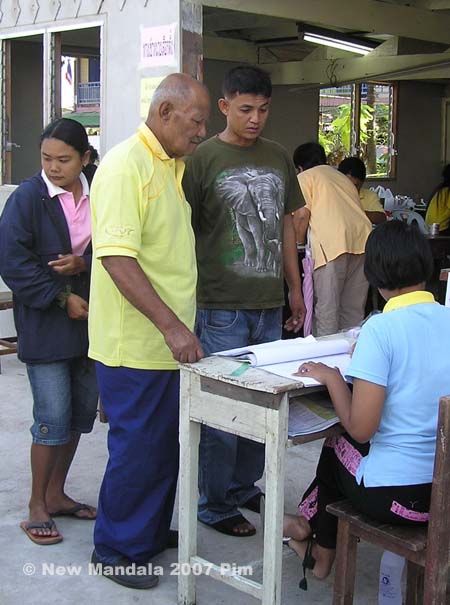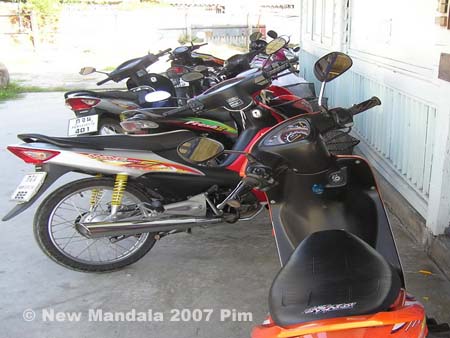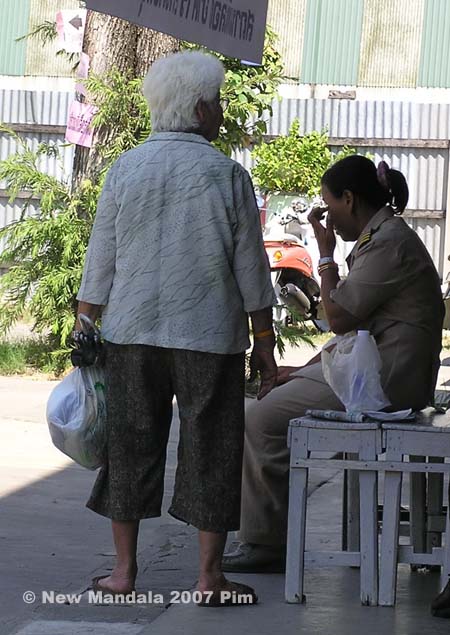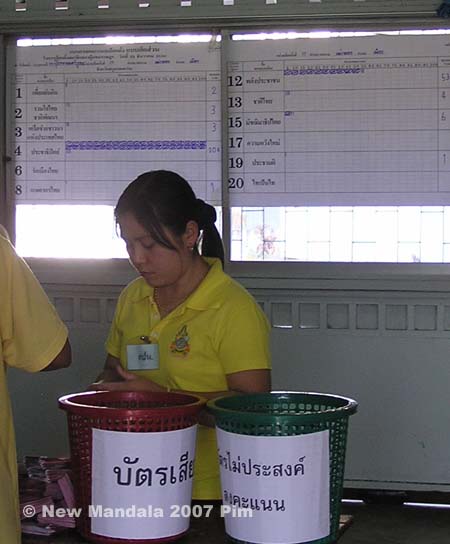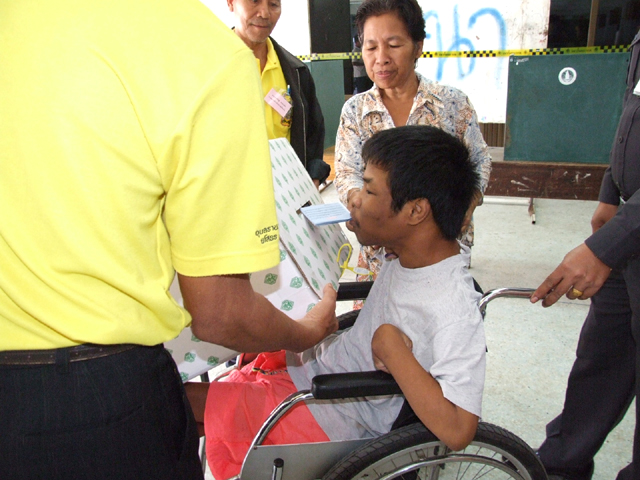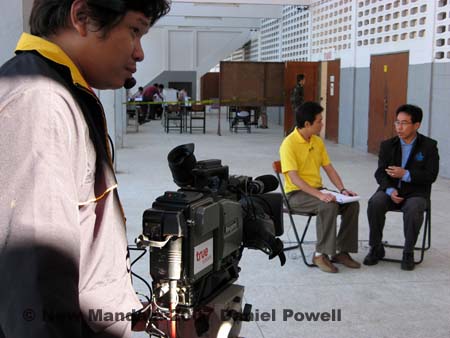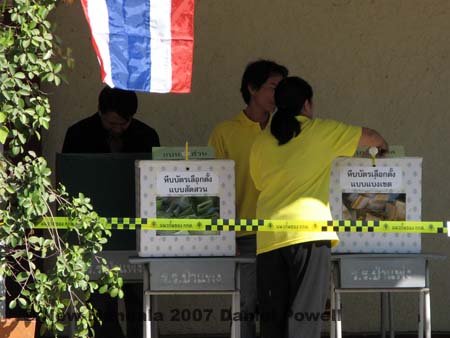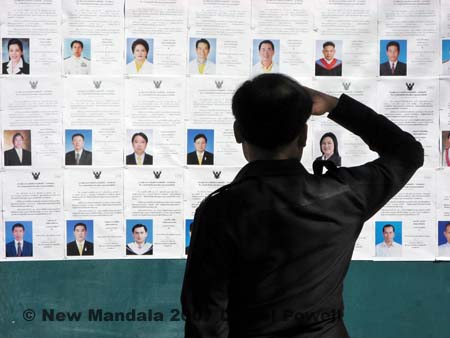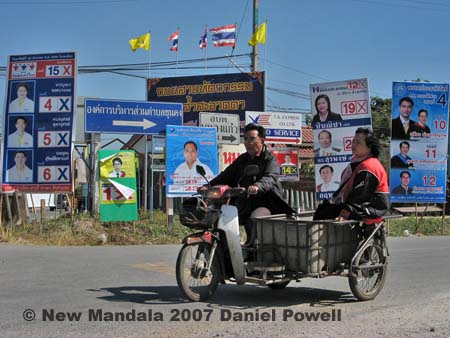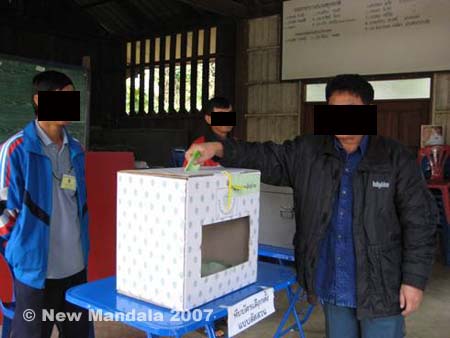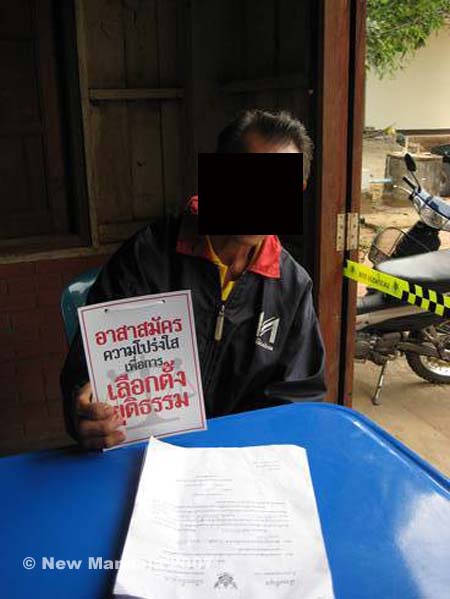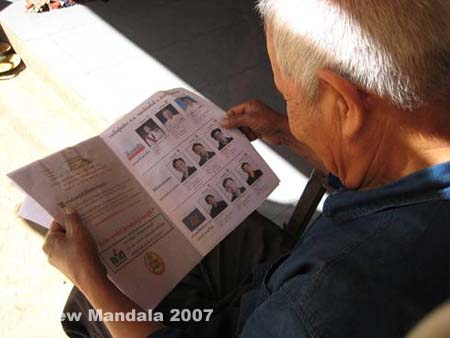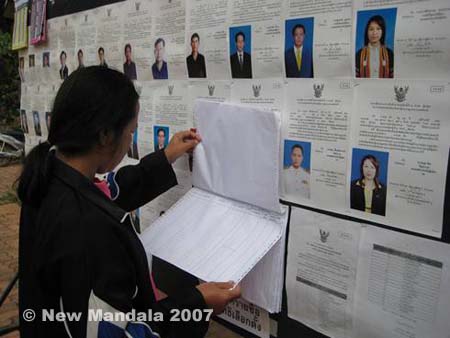Election Archive Home
We will be receiving reports from New Mandala readers throughout Thailand on local aspects of the national election. If you are interested in contributing anything please email us.
On the road in Isan
From Historicus, on the road in Thailand, 24 December: This brief report is impressionistic and based on limited visits and discussions. I drove from Bangkok to Korat via the Cholburi highway then to Chachongsao to Wang Nam Khieow, via Highway 304, and then to Korat city. I visited various sites around Korat – Amphurs Sung Noen, Non Daeng, Muang and Si Khiew. In Korat city I visited the local election commission office and a number of other government offices (following Democrat canvassers). In Non Daeng, I visited a village and the district office. I did not talk to a huge number of people, and was mainly observing. I did speak with a couple of candidates, both Democrats.
The first impression, following a few days in Bangkok, was that usual election advertising declined quickly as one moved into the NE. I am not sure if this is common, but by the time I got to Korat city, there were almost no election posters displayed. Given that they fill every space in Bangkok, it was interesting to see so few posters in Korat. In the city, finding a poster is difficult indeed. One of the campaign managers for the Democrats told me that this was because the electoral laws did not permit much advertising. When I pointed out that Bangkok was flooded with advertising, he simply shrugged.
Out in the villages, in Wang Nam Khieow down to Pakthongchai, I noticed plenty of posters along the road – still less than in Prachinburi. In Non Daeng, I saw very few posters, mainly on the main roads, but very sparse indeed. Not one house in the two villages I visited had any poster displayed.
In one village, where I had more time, the villagers I spoke with claimed to have almost no election information. The only printed information seemed to be the official booklet on all parties. The villagers claimed to be very confused about the election; this was two days prior to the ballot. They claim to know nothing about policies or the candidates. All claimed that this was very different from previous elections.
In this village, my informants claimed that no money had yet been paid to them for votes, but that they suspected that village heads and kamnan were being paid by several parties. When about 100 villagers were bussed from this village to the amphur for an evening election talk by the Ruam Jai Thai Chart Pattana, the rumour was that the village organizers were being paid per head for the villagers they delivered to the two-hour meeting. About 1,000 showed up. On the same evening, a Democrat rally some 100 kilometres away apparently had 200-300 people show up. When paying for votes is discussed, Phua Paendin is often mentioned, but again in the context of community leaders. Machima was said to have paid weeks ago; way too early it was said.
Hua khanaen viewed the counting. Maybe money would have been paid to villagers following the result.
Adding to the confusion in this village, quite large numbers of people had been removed from the electoral role. At one time, some 40% of voters had reportedly been removed, apparently on the orders of the district officer. An interview on Channel 11 with the deputy secretary of the Ministry of Interior indicated that this practice was widespread and unlawful.
In this village, however, some names have been added back. One woman I spoke with had argued at length with the headman, saying that removing people from the roll was illegal just because they weren’t in the house when he visited. He reportedly argued that he was following orders to remove all names of people not in residence when he visited the household. This woman’s household had 8 on the household register, and 4 were removed. Two of these have been added back since then. One of these had to talk with the village head, deputy head, the local election official (a teacher) and two deputy district officers. The family women (3 of them) patiently harassed each of these officials until a document was issued to allow the women to get her right to vote back. Apparently this removal depended on the district officer, as in Phimai district this seemed not to have happened (according to relatives of these women living in that district).
In the end, this village voted strongly for PPP (75%). It had been a strong TRT village in 2005.
Meanwhile, back in Korat city the election campaign was virtually invisible. The Provincial Office has a big platform set up, but nothing else is visible, apart from a few signs on official buildings urging people to vote and to shun vote-buying. There have been big rallies for most parties, and candidates are canvassing, including inside government offices.
Democrat candidates seem resigned to the support that will go to other parties. They are Aphisit supporters, but seem to be mostly left to their own devices in the area. It seems that the Democrats have almost no local organization. Rather, the teams seem to be the candidates’ personal staff and supporters. Some of the comments I heard suggest that there is some concern that the factions in the party are undermining each other already, apparently on the basis that Aphisit is not going to look good at the head of a party that looks like it will be defeated by the PPP. Chuan people seem to be seeking to replace Aphisit. Chuan and others reportedly spoke in Korat and didn’t mention the party leader at all.
Meanwhile, on election day, in a village in Amphur Na Dee (Prachinburi), a headman told me that removing people’s names from the roll was ordered by “higher ups” who wanted a big percentage turnout. This was said to have been a problem during the constitutional referendum. The headman said he’d been told that the higher the turnout, the more democracy there was. So they removed as many people as possible because they had a target turnout figure to meet.
Motorbikes and votes in Samutsongkhram
From Pim in Bangkok, 24 December: I went to observe units 17 and 18 in Muang district of Samutsongkram. They located in one school at the center of market area (municipality) in the district town. People voting here are either business Chinese people or people who live in the area for at least two generations. They know each other quite well. One unit has got registerd voters and the other has 625.
This area has known to be the area of Democrat. And the gossip is that the municipality also supported the Democrat. When I observed people coming to vote, I noticed that many very elderly people came by motorcycle. At first I thought their children took them to vote but why did they just leave them there for the committee to take care of them. When I observed longer I saw only the same few motorcycles. I found out that a few motorcycles were paid by the municipality to help transport the old people to come to vote. They were formed as the members of community committee to help on logistical mobility: taking people to vote, taking the head of the community committee to observe other units, and supervising the voting units.
This year the Ministry of Education has performed something similar to the exit poll. It was sub contracted to Thammasart University. In Samutsongkram, one masters student who is a local has asked the high school students to collect the questionnaire for him.
I did not see clear evident of corruption, however I think the motorcycle service is one of the subtle forms of cheating and corruption.
Solid Democrat showing but PPP victory in Baan Tiam
From AW in Canberra, 10.00 PM: Earlier today (see below) I provided some images from voting in Baan Tiam, the village in northern Thailand where I have been undertaken research for the past few years. The votes have now been counted and PPP has won. There was a high voter turnout with over 90 percent of registered voters turning out. There was less than 10 percent spoilt vote or no-vote. In the party list voting 52 percent voted for People Power, 28 percent for Democrat and 4 percent for Motherland. In the constituency vote, People Power candidates were the three highest ranked candidates.
Human interest
A nice human interest story from Sisaket about a young disabled man who voted with his mouth.
Voting in urban Chiang Mai
From Daniel Powell in Chiang Mai, 6.30 PM: I got out around 10AM this morning to snap a few pictures. First I stopped down the street from my house, but immediately as I pulled out my camera 2 police officers came running over demanding that I put my camera away. After a brief argument I moved on to the municipal stadium in Chiang Mai. Overall the earlier hours seemed quiet at the polling stations I visited. Interestingly I was hassled at nearly every place I tried to take photographs (and I was being very discreet and not attempting to take too many close-ups). The police and military (without guns visible) seemed very edgy at the polling stations.
Anchors for True Vision UBC 7 start their live coverage from Chiang Mai Municipal Stadium
Chiang Mai Municipal Stadium
Campaign Signs at intersection near Hang Dong
Voting in rural Chiang Mai
From RK in Chiang Mai, 23 December. Voting is proceeding smoothly in Baan Tiam, a small village about one hours drive from Chiang Mai. The vote is overseen by a committee made up of local villagers and external representatives (mainly school teachers and some police). Here are some images from the booth.
The local mayor casts his vote.
The observer for Palang Prachachon.
Making a decision.
Checking the voter list.
Votes will be counted at the booth, so we should have a result for you soon after voting closes.
Restaurant staff pissed, patrons not.
From MT in Bangkok, 21 December: As in previous elections the Thai government has banned the sale of alcohol over the election weekend. Insult was added to injury by a similiar ban imposed last weekend when pre-poll votes were cast. These restrictions are seriously upsetting tourist industry businesses who were finally hoping for a good run this tourist season after the previous years of political turmoil and 1 AM curfews. Banning the sale of alcohol two weekends in a row is expected to seriously reduce tourism revenue for many businesses and their staff. The pre-election view from the kitchen staff is that they are pissed off because this is their prime earning time in terms of tips which will be seriously reduced and there is a possibility that bonuses will not be paid unless targets are met. Ouch!
Voting guide from Chiang Mai
From RK in Chiang Mai, 21 December: Voters in Constituency 1 in Chiang Mai have been issued with a detailed voting manual that sets out the roles of members of parliament; how to prepare to vote; the voting procedure and details of all the candidates. It ends with a stern warning – “vote buying and vote selling is wrong for both buyer and seller.”
Doctors and dogs
From Pim in Samutsongkhram, 21 December: The candidate for the Morality Party has a very interesting campaign slogan: “One doctor, one dog.” Clearly it is a play on the Thaksin era “One tambol (sub-district), one product” but is there some deeper meaning?
 Facebook
Facebook  Twitter
Twitter  Soundcloud
Soundcloud  Youtube
Youtube  Rss
Rss 
